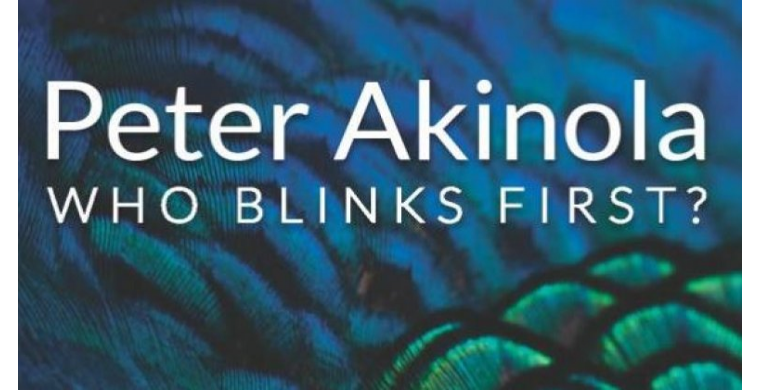An Archbishop who blinked last
Chris Sugden reviews "Peter Akinola, Who Blinks First", by Gbenga Gbesan;
Church of England Newspaper
Oct 14, 2021
In 1948, Winston Churchill, then a rejected though successful war leader and leader of the UK Parliamentary opposition wrote: "For my part, I consider that it will be found much better by all Parties to leave the past to history, especially as I propose to write that history". He would reverse any negative perception of him by writing his version of the story.
Since then evaluations of Churchill have been continually debated. The same may become true of Archbishop Peter Akinola and his role in the debates on Marriage and Sexuality in the Anglican Communion from 1998 to the present.
Peter Akinola: Who blinks first? by Gbenga Gbesan, a journalist from Bishop Akinola's home city of Abeokuta, is the third volume of his biography of the Nigerian leader.
The book is necessary and important due to the detailed chronological record, drawn from primary sources in Archbishop Akinola's archives, of the many meetings in the Anglican Communion on sexuality. The author applauds his leadership of the Church of Nigeria, CAPA, the Global South Primates, and the GAFCON Primates in glowing terms, many times over.
The narrative flows well through 440 pages. They focus almost exclusively on the conflict between the Episcopal Church USA and the Anglican Church of Canada with the Church of Nigeria over TEC's ordination of a priest in an active homosexual relationship as a bishop, the ACC's blessing of same sex unions, and the resultant emergence of GAFCON and the Anglican Church in North America.
Gbenga passes judgement on the career, characteristics and character of all the actors in his drama. He likes tracing people's ancestry, so follows Archbishop Welby's lineage back five generations to plant him in 'the upper crust of the British elite'. Almost all the cited references, apart from Archbishop Akinola's personal records of reports, communiques and notes of meetings, are from Wikipedia.
Gbenga tells his story in primary colours and sharp contrasts. The Lutheran Reformation, he tells us, gave birth to freedom and the Enlightenment which replaced traditional Christian orthodoxy with secular philosophy. The West is pitted against the Global South in an expression of colonialism.
Associated material covers the emergence of the North American 'gay lobby', and 'what Archbishop Akinola did next' in establishing a foundation to train unemployed Nigerian youth, during which he suffered an almost fatal kidnapping.
An index would be useful. There are at least a dozen typos, including spelling of proper names.
Errors flaw the material. Christ Church Cathedral in Oxford is not the university chapel; Lord Butler of Saffron Walden was not 'a master' at Trinity College Cambridge but the Master of the College; the meeting in Amman Jordan prior to GAFCON 2008 in Jerusalem was not a pre-conference summit, but a necessary duplication of the Jerusalem programme to accommodate those from Muslim countries who could therefore not attend a conference in Israel.
More serious is that in the appointment and subsequent withdrawal of Jeffrey John as suffragan bishop of Reading, Reading is not a diocese and his nomination was not by the Crown Nominations Commission on the initiative of Rowan Williams, but by Bishop Richard Harries of Oxford with Williams' consent. While nine diocesan bishops ( and some suffragans) wrote to Archbishop Rowan objecting to John's appointment, no mention is made of the initial grassroots movement, begun in Oxford triggered by Dr Philip Giddings, then lay chairman of General Synod, called 'Anglican Mainstream' of which he was first chairman. It was to this movement's concerns that the bishops were responding. This term is cited later in the book but no progenitors are ascribed.
In describing the 1998 Lambeth Conference, no mention is made of the team led by Canon Vinay Samuel from the Oxford Centre for Mission Studies ( which Gbenga notes produced a directory of bishops for the Conference) with Global South, English and North American leaders who formed a support group for orthodox bishops. This group crafted the successful amendment to the original 'liberal' draft of Lambeth 1.10. The amended resolution became the touchstone of the orthodox case in the Communion. This team also formed the core of the "Worldwide Anglican Mainstream Leaders" who met in 2003 to respond to the consecration of Gene Robinson.
The narrative consistently elides homosexuality with homosexual practice. Those opposed to active homosexual practice by Christians, are identified as being opposed to homosexuality, understood as an orientation or inclination. Yet Lambeth 1.10 commits the church to 'minister pastorally and sensitively to all irrespective of sexual orientation and to condemn irrational fear of homosexuals' and distinguishes this from 'blessing same-sex unions' and 'ordaining those involved in same-sex unions'.
This is a first draft of history. At least one Ph.D dissertation is researching the same topic. Hopefully, it with others will give due regard to the other movements and people throughout the Communion who took part in this continuing struggle.
[Peter Akinola, Who Blinks First, by Gbenga Gbesan; Resource Publications, an Imprint of Wipf and Stock, Eugene, Oregon, 2020 £33.31 including shipping.]
Published in shorter form in the Church of England Newspaper October 15














